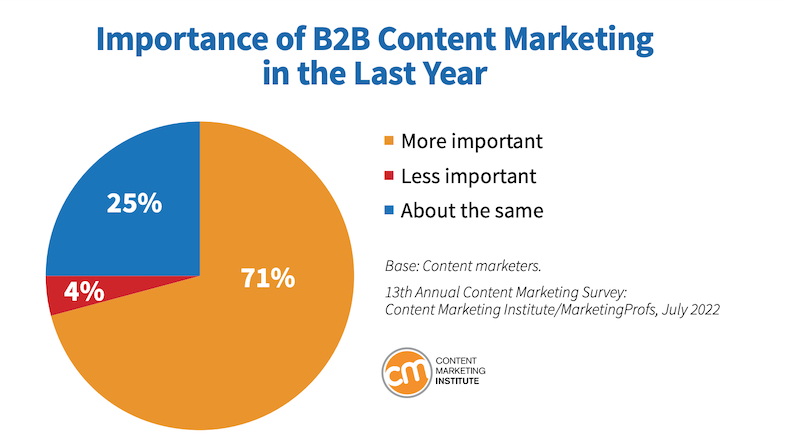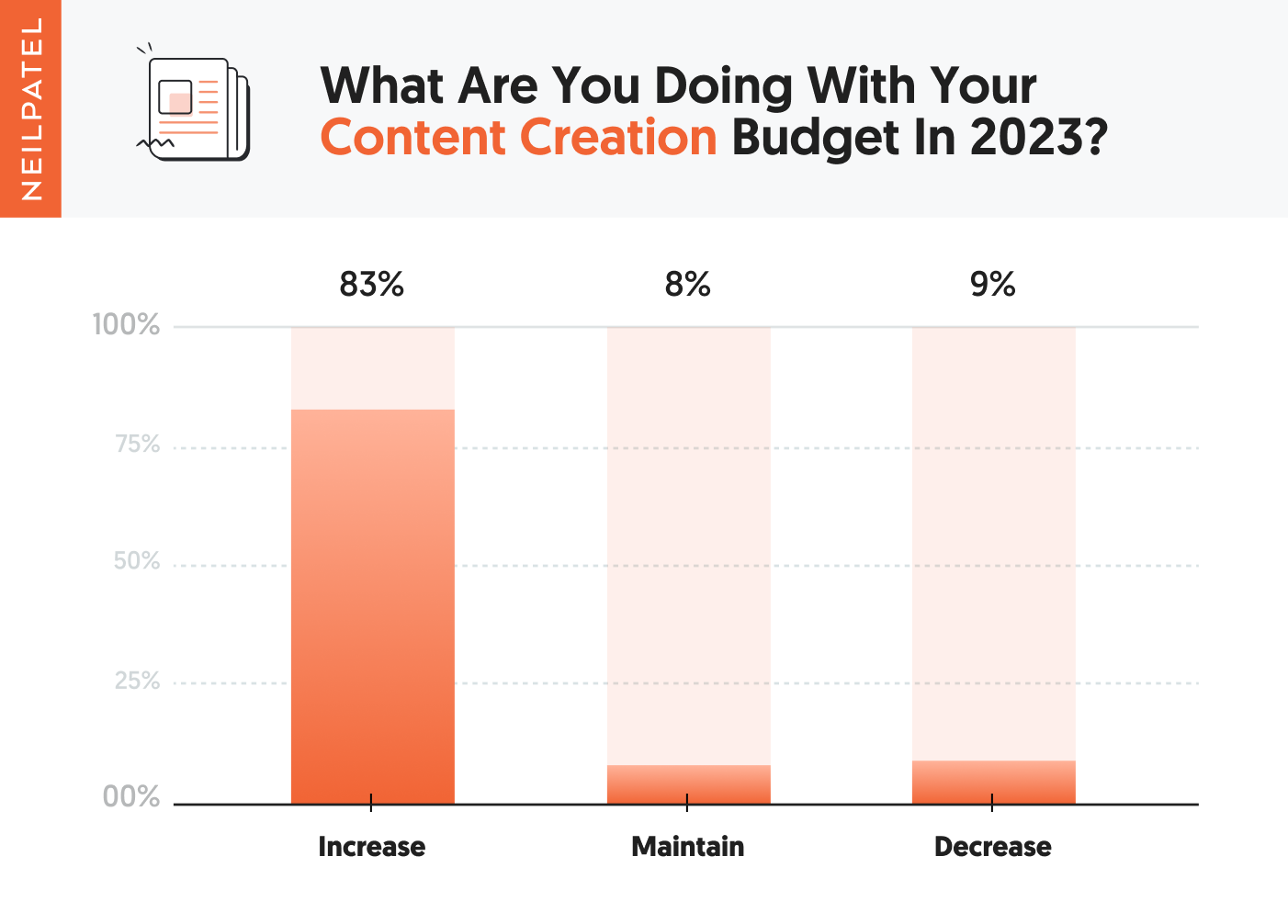
By now, you know that a great content marketing strategy makes a positive impact on business results. If you’re a larger business, you need to show the world that you are a leader in your industry. As a startup, you need to get attention, generate leads, and drive growth.
So the real question is how much do we need to spend on content marketing to drive growth in those areas?
Our own clients have proven that on average, content marketing delivers a 7x conversion rate. That’s $7 for every dollar spent. But where should you start?
Let’s explore 3 things you need to consider when setting the right budget amount for content marketing.
Quick Takeaways
- Because of the higher ROI, companies are allocating more budget to Content Marketing this year.
- On average, companies are allocating 25% of their marketing budget to content.
- Successful content marketers don’t just create content. They implement a strategy, identify goals, and measure results.
Content Marketing Becoming More Important
In uncertain economic times, short-sighted companies cut marketing costs, especially for tactics that show little ROI or are difficult to measure.
And while spending on advertising is down over the last year, content marketing appears to becoming more important to most companies.
The Content Marketing Institute reported late last year that 71% of B2B companies are putting more weight behind their content marketing efforts due to the overall measurability, value and ROI it can achieve.

A recent study by Neil Patel also shows that 83% of companies are increasing their content marketing budgets in 2023.

Semrush has also just released their latest study showing that nearly 70% of marketers plan to increase their budget in 2023.
Content marketing is becoming more important in 2023. It’s getting more budget. It is surviving the fear of an economic downturn because companies large and small need to grow in 2023 no matter what the economy is doing.
And content marketing delivers on that growth!
Ok so we know we need content marketing. And we know we need more content. Content marketing is more important. How do we go about setting a content marketing budget?
How Much Budget Do I Need For Content Marketing
Obviously every company has different needs and budget scenarios. So we can’t prescribe the precise content marketing budget number for every company. But we can look at some industry trends to better understand how companies are investing in content marketing.
Research shows that companies spend an average of 26% of their total marketing budget on content marketing. The most successful spend closer to 40%, and the least successful down to 14%.
Semrush’s recent report says that most 73% of companies spend more than $1,000 per month on content marketing, and the most successful spend as much as $10,000.
So let’s say the average content marketing budget is $5000 per month.
Our own content marketing services include strategy, content, and measurement start at $2500 / month for 1 article / week. We also offer $4500 / month for 2 articles per week. So I think your content marketing budget for us would fall in line for most companies budgets.
Again, none of this is one-size-fits-all, but the takeaway here is that while content marketing is extremely cost-effective, it also requires a substantial financial commitment — especially in the beginning stages, when you’re doing a lot of set up like content auditing, website optimization, and building your blog.
Must-Haves For Your Content Marketing Budget
The right strategy
Many of our clients come to us after having been frustrated after hiring a freelancer from Fiverr or Upwork. There are many great writers on those platforms. You can also find amazing full-time copywriters for around $70,000 per year in salary. But you still have to tell them what to right about!
An effective content marketing strategy defines the keywords your audience uses, the content they consumer, the channels where they consume it. So that you can identify the right kind of content to create in the first place.
This is where services like ours can be so valuable. We identify the pillars of content you need, the keywords your audience is using by looking at competitive gaps, long tail phrases, and purchase intent. We then brainstorm creative headlines for our writers to write for our clients.
And we measure results. We help our clients generate amazing stories of success such as 2-3x more leads, 300% traffic gains, 60% higher conversion rates and bottom line growth in revenue and new customers that translated into massive content marketing ROI.
So strategy is important. But you also need the right team.
The right team
Great content requires great creators. One place you should never skimp on your content marketing spend is the right people to create your content. Haphazardly adding content creation to an existing role within your team without thinking about the time and expertise it requires is a dangerous strategy.
Content creators have specialized skills that optimize your content to get results. Here are some roles you might need to invest in as part of your content marketing budget:
- SEO writers can use keywords and other SEO best practices to optimize your written content to rank on search engine results pages (SERPs).
- SEO specialists optimize the technical aspects of your website to rank on SERPs.
- Copywriters are trained to write high-quality, high-performing written advertising and marketing content.
- Editors who make sure the content meets your brand guidelines
- Support staff who can upload, publish and share your content
- Demand generation specialists who know how to help drive conversions
- Paid media specialists who maximize the efficiency of your spend
(Or you can just hire us because we have all these folks already.) 
The list isn’t limited to these roles but does include the most commonly needed skills in a content marketing team. Again, assigning these responsibilities to a team member without the appropriate skills and training will likely result in underperforming content.
You can also invest in a content marketing agency to handle your strategy for you. Good agencies have the expertise and resources to deliver consistent content, proven strategies, and frequent performance reporting. This frees you up to focus on other strategic priorities.
While outsourcing your content creation is an investment, it’s often more affordable than hiring full-time staff and it allows you to be confident in your content strategy without being bogged down by the work it requires.
Technology tools
Automation, data analytics, social media — all of these are important components of a good content marketing strategy. You can optimize your capabilities in each of these areas with technology tools to support them.
These tools give you important data insights and allow you to scale your strategy to reach larger audiences. Some examples include:
- Email marketing software enables you to store, email and track content subscriber lists and provides templates for creating well-designed emails.
- Social media software gives you the ability to digitally house your content calendar, automate posting, post simultaneously across platforms, and access performance reports.
- Google analytics gives detailed reports on web traffic.
- Website CMS platforms have analytics capabilities that every company should be taking advantage of as part of their website management.
- CRM platforms are more comprehensive and allow companies to automate sales, marketing, and reporting processes.
Your content
Depending on how your team is built, your content may or may not come with its own separate price. Often, though, specific projects that fall outside of the scope of a contract with an agency may require additional costs.
These can include anything from professional produced videos to white papers to print brochures and more.
We charge anywhere from $3500 to $5000 for e-books
Think about what types of print and digital content you’ll be creating and incorporate those potential costs into your budget.
How To Think About Your Content Marketing Budget
The mistake companies often make when it comes to setting up a content marketing budget is thinking strictly in financial terms. Like: here’s what we can afford, so here’s our budget. Now let’s spend it.
But your content marketing spend is way more than just a number. Thinking only in terms of what you can spend without thinking seriously about how you can execute will lead to a lot of wasted money and unneeded frustration.
In short: don’t budget for money you won’t have the time or resources to spend, and don’t spend money on things you can’t execute effectively.
There’s no magic formula every company can use to determine their perfect content marketing spend, and the truth is that no budget will ever get it exactly right. But by thinking intentionally about creating a smart budget that capitalizes on every dollar spent, you can set yourself up for success.
We recommend looking at your content marketing budget from a prioritization standpoint: what are the most important items in your budget? Think about how you’ll execute each of these items. What will your timeline for execution look like? Which people or teams will be responsible? What other resources will this require?
Clearly outlining all of this during the budgeting process can help you identify what you can realistically execute well. Once you get to a point where you think you’re spreading resources too thin, it’s time to think about cutting lower-priority items out.
Our recommendation: definitely do set stretch goals, but prioritize setting your teams and your company up for success. Use your best judgement to set a budget that contains the right balance.
Check out our recent guide on budgeting for content to get a deeper dive on best practices to support this process.
Content Marketing Budget Examples For Every Size Business
$1000 / month: You really can’t go much lower than this. $1000 per month should get you around 2 articles for the month. Again, you could go on a freelancer platform for less but then you need to make sure you are creating content that aligns with your target audience and provides measurable value. Also keep in mind, that our own content marketing frequency research shows that you need to blog weekly to start showing real growth in traffic and leads.
$2500 / month: This will get you 1 article per week from us plus the annual content marketing plan, and monthly reports. Most of clients on this plan start to see growth in SEO and search rankings after about 3-4 months. The average growth rate is just under 100% for the year, so almost double your traffic and leads.
$5000 / month: this will get you 2 articles per week, the annual content plan, monthly reporting, and 2 demand generation e-books. Our clients at this spend level are seeing results a little but quicker: around 2-3 months. And they average 138% year–over-year growth in leads and traffic.
$10,000 / month: this gets you the supersized plan of strategy, content and paid promotion. You can expect to see growth like we explained above plus is happens immediately! At this level of spend, we see clients experience around 10,ooo new visitors per month in website traffic from month 1 and it just goes up from there as the organic traffic gains start to materialize. Over time, we also start to re-target those visitors with demand gen offers that translate to predictable leads and new customers.
Get ROI From Your Content Marketing Budget
Are you ranking high and driving traffic? Are your conversions on the rise with the power of content? If not, then your budget may not be in alignment with your goals. Let’s get them on the same page.
If you’re ready to get more traffic to your site with quality content published consistently, check out our Content Builder Service and schedule a quick consultation today!
The post How Much Budget Do You Need for Content Marketing? appeared first on Marketing Insider Group.

